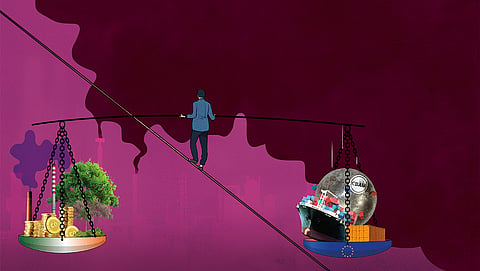

The global race to build a low-carbon economy is gaining momentum. But this much-needed push to reduce greenhouse gas (GHG) emissions has raised concerns about economic rivalry and trade protectionism. Under the guise of climate action, developed countries are trying to protect their domestic manufacturers from global competition while shifting their environmental responsibilities on others.
The European Union’s (EU’s) Carbon Border Adjustment Mechanism (CBAM) is a clear example of this. The initiative aims to impose a carbon tariff on imports of energy-intensive products, based on the GHG emissions generated during their production.
India, in its Economic Survey report released in July 2024, ahead of the Union Budget 2024-25, argues that CBAM and similar proposed measures from the US and the UK violate the Paris Agreement’s principle of “Common but Differentiated Responsibilities”, as developed countries shift the burden of climate finance from the Global North to the Global South through carbon taxes.
India’s concerns are echoed by other developing nations. In June, South Africa condemned CBAM during the Ministerial Declaration for the High-Level Political Forum for Sustainable Development 2024, calling it an “extraterritorial, unilateral, coercive, and trade-distorting measure disguised as climate protection.” In 2023, at the 28th Conference of the Parties (COP28) to the UN Framework Convention on Climate Change (UNFCCC) in Dubai, countries like Brazil, Egypt and China, along with blocs such as the 54-member Group of African States, and the newly industrialised group of countries, comprising Brazil, South Africa, India and China (BASIC), voiced fears that these measures could harm their economies and undermine poverty eradication efforts. The impact could be particularly severe over the short to medium term, affecting the competitiveness of developing countries’ export-oriented industries.